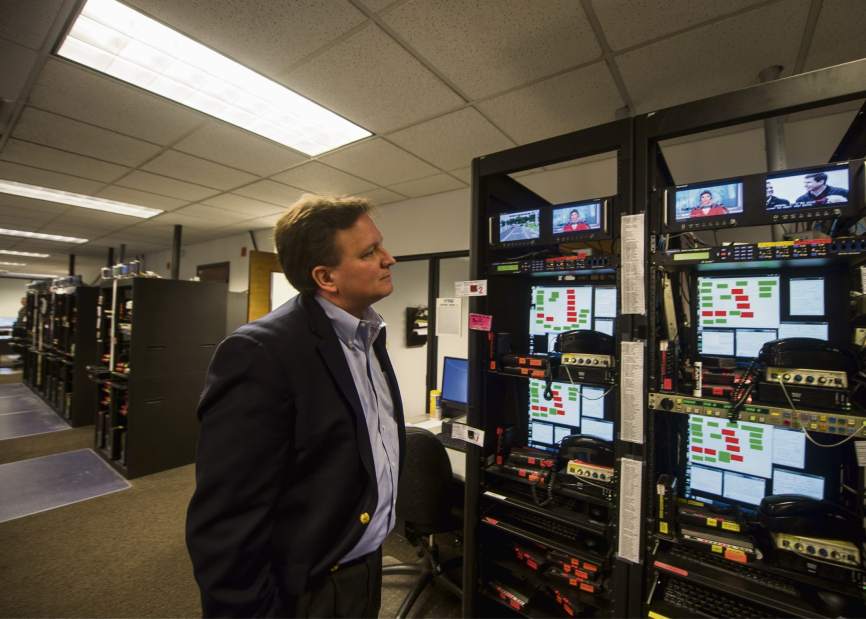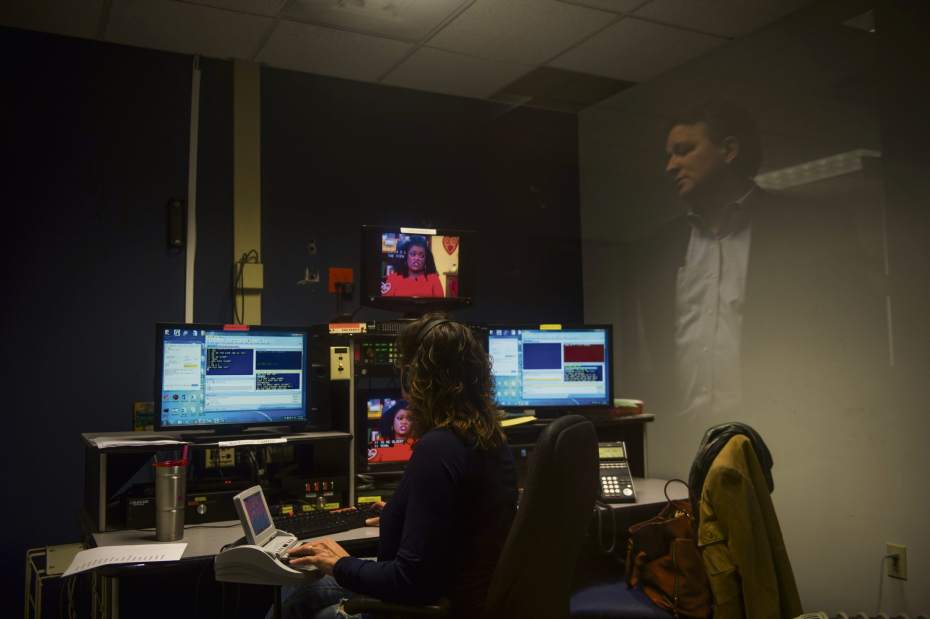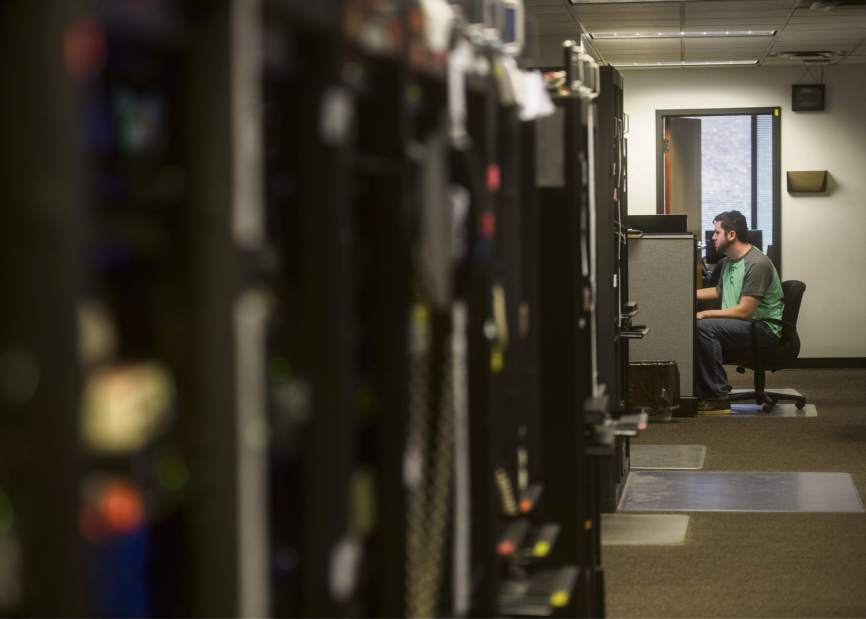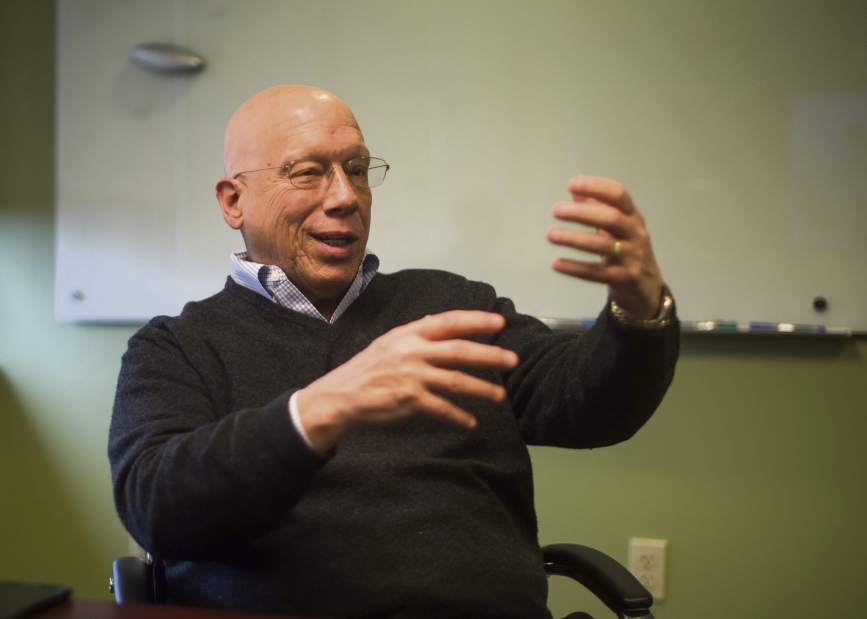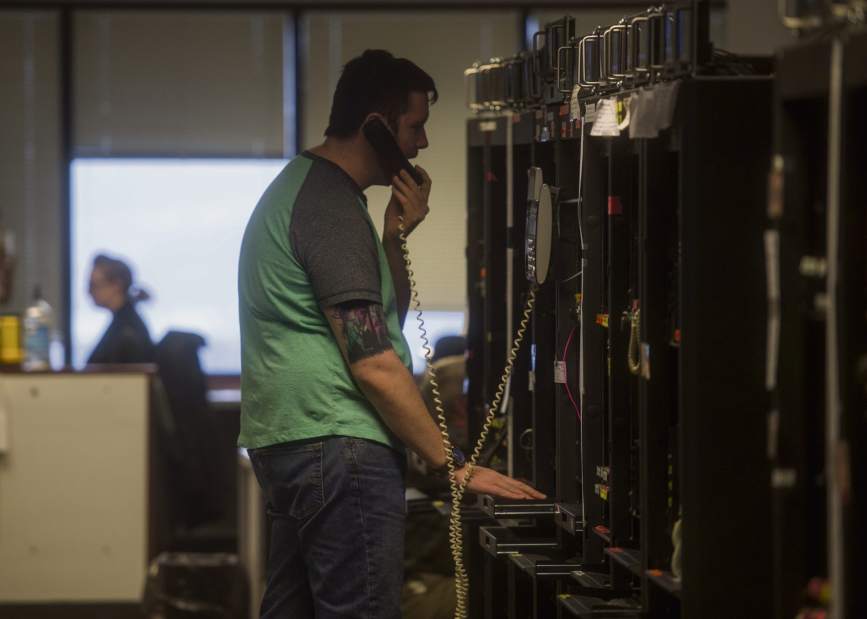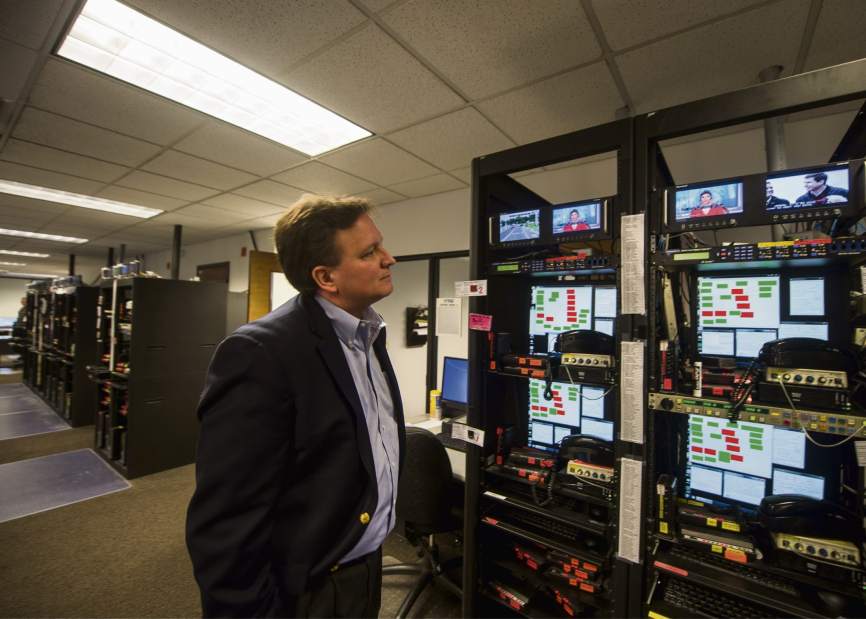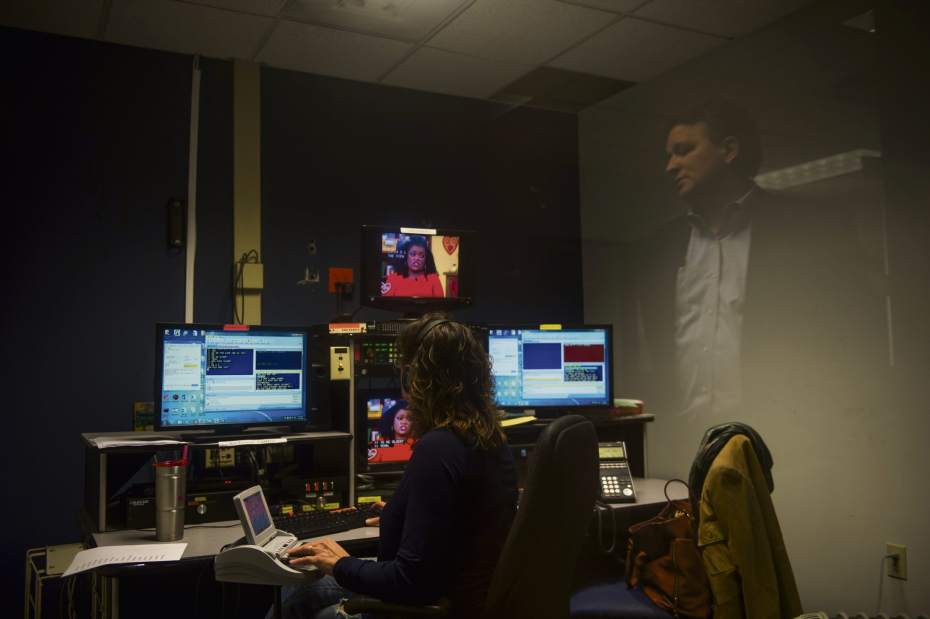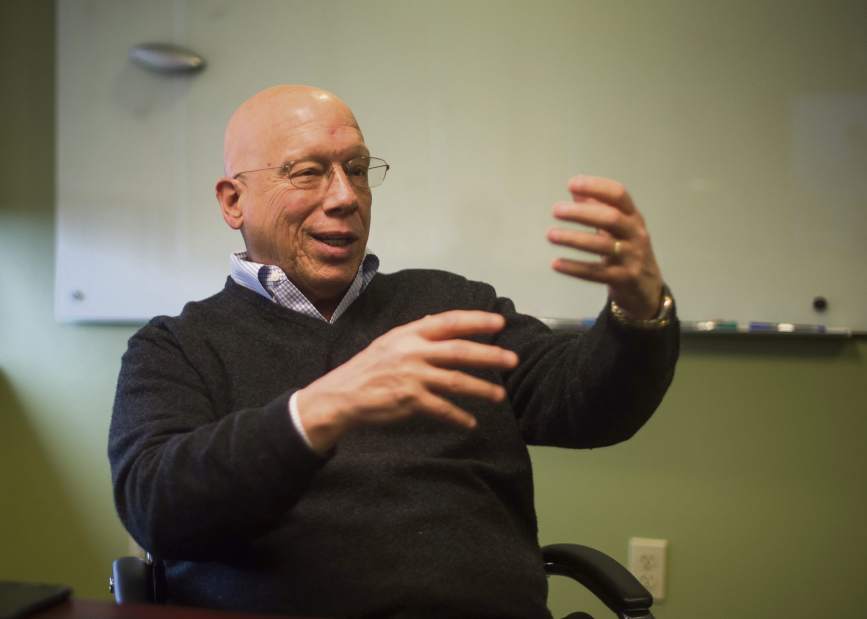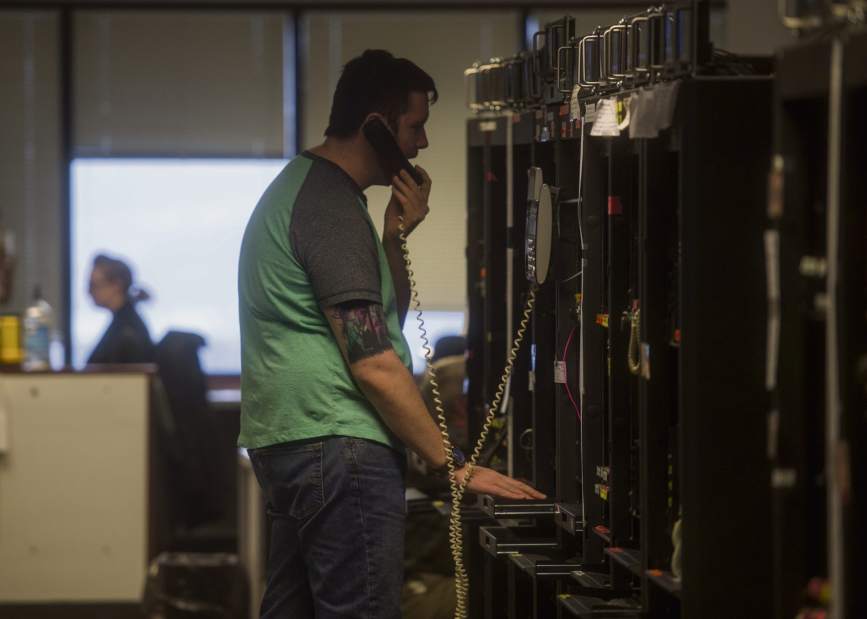Closed captioning live sports is an Olympic task for Pittsburgh-area firm
Vitac
John Capobianco, Chief Marketing Officer for Vitac, answers questions from a Tribune-Review reporter inside their facilities at Southpointe in Canonsburg, on Feb. 14, 2018.
The athletes competing in Pyeongchang, South Korea, this month have trained for years to be at the top of their games for the Winter Olympics.
So have the hundreds of employees poised at keypads in a Western Pennsylvania office building and elsewhere capturing every word spoken during hundreds of hours of NBC's Winter Olympics coverage. They furiously type each word to make them appear in closed captioning boxes on TV screens across the United States.
VITAC Corp., which started in Pittsburgh in the 1980s, is the sole provider of closed captions for NBC's coverage of the Olympics. Captioners at VITAC offices in Cecil and near Denver, and many working from their homes across the country, will watch and write the more than 600 hours of sports coverage and the 24/7 news coverage across NBC's networks and shown online.
“And there's just tons of curling,” said Chuck Karlovits, VITAC's chief operations officer, as he watched captioning appear on a small screen showing the sport Wednesday afternoon.
Karlovits, whose father, Joseph Karlovits, started the company in 1981, said VITAC puts its best and most experienced captioners on the Olympics. They work from about 7 p.m. to 5 a.m. each day, watching the sports live as NBC broadcasts them. They type, using a stenograph, at about 250 words per minute and strive for 98 percent accuracy.
Captioners spend about three hours studying sports, athlete names, venues and history for each one hour of on-air programming they watch. They build exhaustive dictionaries for their stenographs with exotic names and locations. They have to be ready to jump from one sport to another at a moment's notice. One minute NBC could be showing the biathlon and then cut to the luge if there's a crash.
“It's the hardest thing they will write,” Karlovits said.
It's harder than the Super Bowl, harder than talking heads on CNN, harder than QVC and harder than NHK, an English-language Japanese channel, all of which VITAC captions.
Crystal Cermak, the real-time training manager at VITAC, who has worked past Olympics, said the volume of information — from athletes to venues — and the pressure of knowing the country is watching makes it a challenge. One captioner got assigned to work NBC's hockey game of the day. That person had to prepare notes on six different teams depending on which game NBC decided to feature, Cermak said.
“You put in numerous hours before you even sit down,” Cermak said.
Sitting down at her stenograph, Cermak's fingers move across the few keys like a pianist. Stenographs don't have a full keyboard but instead have keys that represent sounds. Each stenographer creates their own custom dictionary for how certain words are typed. Stenographers can hold down several keys at once, like a chord on a piano, to type long words with few keystrokes.
Pyeongchang takes Cermak two keystrokes.
Karlovits said only the top 1 percent of stenographers are good enough to do real-time captioning.
Cermak laughs when people suggest that she has a dream job. Captioners do get to watch TV all day, but keeping up with the speed of live TV is mentally and physically straining. Commercial breaks are their timeouts. If a baseball game goes into extra innings, they may bring in a reliever to take over.
And captioning has sort of ruined TV for Cermak. She can't sit back and watch a show at home and not think about work.
“Because if I'm not watching the captions, I'm hearing the words and thinking, ‘How would I write that? Is that in my dictionary?” Cermak said.
Captioners watch live broadcasts, type the captions and send them back to the networks. The networks encode them and put them on the screen. The encoding takes the most time, accounting for the three- to seven-second delay on live TV.
The Olympics aside, VITAC will caption 525,000 hours of programming a year, said John Capobianco, the company's chief marketing officer. About 50 million people depend on the service.
VITAC got its first contract to provide captioning with KDKA in 1986. Ten years later, the company outgrew its space in Downtown Pittsburgh and moved to Southpointe in Cecil. The company won't say how many people it employees, only that hundreds work on captioning at offices in Cecil, near Denver and from their homes.
Humans do a bulk of the captioning, Capobianco said. Technology is advancing but can't caption live TV with the accuracy of a human.
“It has to be 98 percent accurate or better for it to mean something,” Capobianco said. “Machines can't do that. Only humans can.”
That said, Capobianco knows a day will come when computers will take over the bulk of the work. He doubts that will be in his lifetime.
About half of Vitac's space is devoted to captioning television — news, sports, talk shows — in real time. Captioners sit in sound-proof control rooms.
On the other side of the building, employees work on captioning prerecorded shows and programs. The prerecorded side is quiet. Employees sat at desks with headphones on and full keyboards in front of them.
They don't have to caption at the speed of live TV and don't use a stenograph. These captioners have the time to include text about other sounds on screen like background noise, laughs or music playing. They can move the caption blocks around so that the words an actor says appear directly below the actor and not just in the middle of the screen. And they can match the captions up with the sound so they appear as the actors are speaking.
Karlovits said it takes about four hours to caption the 22 minutes of programming that typically make up a half-hour television show.
Back on the live television side of the operation, a stenographer sat in a sound-proofed control room, headphones on, watching The View. Her fingers bounced on the keypad, flowing with words from Whoopi Goldberg as she talked to a child. Millions of people depend on what the stenographer types to know what Goldberg is saying.
“And they get one shot,” Karlovits said.
Aaron Aupperlee is a Tribune-Review staff writer. Reach him at aaupperlee@tribweb.com, 412-336-8448 or via Twitter @tinynotebook.

